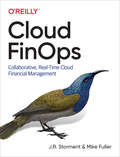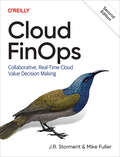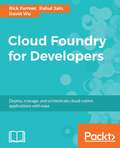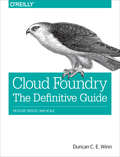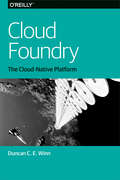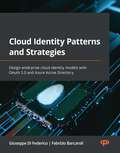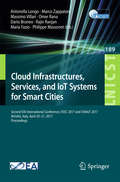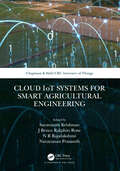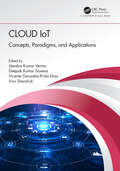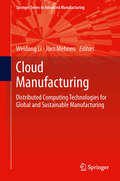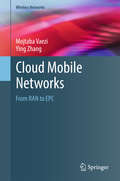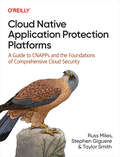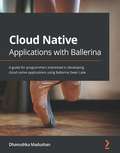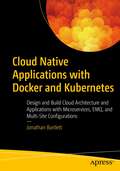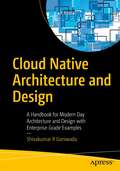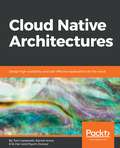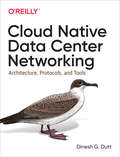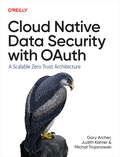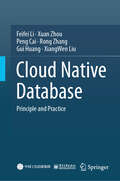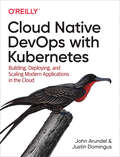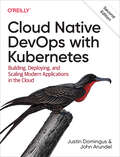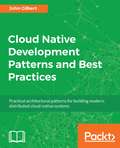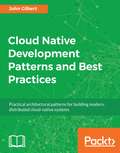- Table View
- List View
Cloud FinOps: Collaborative, Real-Time Cloud Financial Management
by Mike Fuller J. R. StormentDespite many uncertainties in cloud computing, one truth is evident: costs will always tend to go up unless you’re actively engaged in the process. Whether you’re new to managing cloud spend or a seasoned pro, this book will clarify the often misunderstood workings of cloud billing fundamentals and provide expert strategies on creating a culture of cloud cost management in your organization.Drawing on real-world examples of successes and failures of large-scale cloud spenders, this book outlines a road map for building a culture of FinOps in your organization. Beginning with the fundamental concepts required to understand cloud billing concepts, you’ll learn how to enable an efficient and effective FinOps machine.Learn how the cloud works when it comes to financial managementSet up a FinOps team and build a framework for making spend efficiency a priorityExamine the anatomy of a cloud bill and learn how to manage itGet operational recipes for maximizing cloud efficiencyUnderstand how to motivate engineering teams to take cost-saving actionsExplore the FinOps lifecycle: Inform, Optimize, and OperateLearn the DNA of a highly functional cloud FinOps culture
Cloud FinOps: Collaborative, Real-Time Cloud Value Decision Making
by Mike Fuller J. R. StormentFinOps brings financial accountability to the variable spend model of cloud. Used by the majority of global enterprises, this management practice has grown from a fringe activity to the de facto discipline managing cloud spend. In this book, authors J.R. Storment and Mike Fuller outline the process of building a culture of cloud FinOps by drawing on real-world successes and failures of large-scale cloud spenders.Engineering and finance teams, executives, and FinOps practitioners alike will learn how to build an efficient and effective FinOps machine for data-driven cloud value decision-making. Complete with a road map to get you started, this revised second edition includes new chapters that cover forecasting, sustainability, and connectivity to other frameworks.You'll learn:The DNA of a highly functional cloud FinOps cultureA road map to build executive support for FinOps adoptionHow to understand and forecast your cloud spendingHow to empower engineering and finance to work togetherCost allocation strategies to create accountability for cloud and container spendStrategies for rate discounts from cloud commitmentsWhen and how to implement automation of repetitive cost tasksHow to empower engineering team action on cost efficiency
Cloud Foundry for Developers
by Rahul Jain Rick Farmer David WuDeploy and scale applications on Cloud Foundry About This Book • Gain hands-on experience using Cloud Foundry • Implement deployment, management and scaling of applications on Cloud Foundry • Learn best practices and troubleshooting tips for running applications on Cloud Foundry Who This Book Is For This book is aimed at developers, engineers and architects who want to learn key aspects of developing and running applications on the Cloud Foundry Platform. Prior knowledge Cloud Foundry is not necessary. What You Will Learn • Understand Cloud Foundry (CF) tools and concepts. • Understand the breadth of possibilities unleashed through a lightweight agile approach to building and deploying applications. • Design and deploy cloud native applications that run well on Cloud Foundry. • Learn Microservice design concepts and worker applications. • Customize service brokers to publish your services in the Cloud Foundry marketplace. • Using, managing and creating buildpacks for the Cloud Foundry Platform. • Troubleshoot applications on Cloud Foundry • Perform zero-downtime deployments using blue/green routes, A/B testing, and painless rollbacks to earlier versions of the application. In Detail Cloud Foundry is the open source platform to deploy, run, and scale applications. Cloud Foundry is growing rapidly and a leading product that provides PaaS (Platform as a Service) capabilities to enterprise, government, and organizations around the globe. Giants like Dell Technologies, GE, IBM, HP and the US government are using Cloud Foundry innovate faster in a rapidly changing world. Cloud Foundry is a developer's dream. Enabling them to create modern applications that can leverage the latest thinking, techniques and capabilities of the cloud, including: • DevOps • Application Virtualization • Infrastructure agnosticism • Orchestrated containers • Automation • Zero downtime upgrades • A/B deployment • Quickly scaling applications out or in This book takes readers on a journey where they will first learn the Cloud Foundry basics, including how to deploy and scale a simple application in seconds. Readers will build their knowledge of how to create highly scalable and resilient cloud-native applications and microservices running on Cloud Foundry. Readers will learn how to integrate their application with services provided by Cloud Foundry and with those external to Cloud Foundry. Readers will learn how to structure their Cloud Foundry environment with orgs and spaces. After that, we'll discuss aspects of continuous integration/continuous delivery (CI/CD), monitoring and logging. Readers will also learn how to enable health checks, troubleshoot and debug applications. By the end of this book, readers will have hands-on experience in performing various deployment and scaling tasks. Additionally, they will have an understanding of what it takes to migrate and develop applications for Cloud Foundry. Style and Approach A practitioner's guide to Cloud Foundry that covers the areas of application development, deployment and services.
Cloud Foundry: Develop, Deploy, and Scale
by Duncan C. E. WinnHow can Cloud Foundry help you develop and deploy business-critical applications and tasks with velocity? This practical guide demonstrates how this open source, cloud-native application platform not only significantly reduces the develop-to-deploy cycle time, but also raises the value line for application operators by changing the way applications and supporting services are deployed and run. Learn how Cloud Foundry can help you improve your product velocity by handling many of essential tasks required to run applications in production.Author Duncan Winn shows DevOps and operations teams how to configure and run Cloud Foundry at scale. You’ll examine Cloud Foundry’s technical concepts—including how various platform components interrelate—and learn how to choose your underlying infrastructure, define the networking architecture, and establish resiliency requirements.This book covers:Cloud-native concepts that make the app build, test, deploy, and scale fasterHow to deploy Cloud Foundry and the BOSH release engineering toolchainConcepts and components of Cloud Foundry’s runtime architectureCloud Foundry’s routing mechanisms and capabilitiesThe platform’s approach to container tooling and orchestrationBOSH concepts, deployments, components, and commandsBasic tools and techniques for debugging the platformRecent and soon-to-emerge features of Cloud Foundry
Cloud Foundry: The Cloud-Native Platform
by Duncan C. E. WinnWhat exactly is a cloud-native platform? It’s certainly a hot topic in IT, as enterprises today assess this option for developing and delivering software quickly and repeatedly. This O’Reilly report explains the capabilities of cloud-native platforms and examines the fundamental changes enterprises need to make in process, organization, and culture if they’re to take real advantage of this approach.Author Duncan Winn focuses on the open source platform Cloud Foundry, one of the more prominent cloud-native providers. You’ll learn how cloud-native applications are designed to be "infrastructure unaware" so they can thrive and move at will in the highly distributed and constantly evolving cloud environment.With this report, you’ll explore:Technical driving forces that are rapidly changing the way organizations develop and deliver software todayHow key concepts underpinning the Cloud Foundry platform leverage each of the technical forces discussedHow cloud-native platforms remove the requirement to perform undifferentiated heavy lifting, such as provisioning VMs, middleware, and databasesWhy cloud-native platforms enable fast feedback loops as you move from agile development to agile deploymentRecommended changes and practical considerations for organizations that want to build cloud-native applications
Cloud Identity Patterns and Strategies: Design enterprise cloud identity models with OAuth 2.0 and Azure Active Directory
by Giuseppe Di Federico Fabrizio BarcaroliGet to grips with identity patterns and design a structured enterprise identity model for cloud applicationsKey FeaturesLearn all you need to know about different identity patterns and implementing them in real-world scenariosHandle multi-IDP-related common situations no matter how big your organizationGain practical insights into OAuth implementation patterns and flowsBook DescriptionIdentity is paramount for every architecture design, making it crucial for enterprise and solutions architects to understand the benefits and pitfalls of implementing identity patterns. However, information on cloud identity patterns is generally scattered across different sources and rarely approached from an architect's perspective, and this is what Cloud Identity Patterns and Strategies aims to solve, empowering solutions architects to take an active part in implementing identity solutions. Throughout this book, you'll cover various theoretical topics along with practical examples that follow the implementation of a standard de facto identity provider (IdP) in an enterprise, such as Azure Active Directory. As you progress through the chapters, you'll explore the different factors that contribute to an enterprise's current status quo around identities and harness modern authentication approaches to meet specific requirements of an enterprise. You'll also be able to make sense of how modern application designs are impacted by the company's choices and move on to recognize how a healthy organization tackles identity and critical tasks that the development teams pivot on. By the end of this book, you'll be able to breeze through creating portable, robust, and reliable applications that can interact with each other.What you will learnUnderstand the evolution of identity in the enterpriseDiscover basic to advanced OAuth patterns and implementationsFind out how OAuth standards are usually adopted in the enterpriseExplore proven solutions for modern identity challengesUse Azure AD for implementing identity solutionsComprehend how company structure and strategies influence design decisionsWho this book is forThis book is for cloud security engineers and identity experts. Enterprise architects, tech leads, developers, and anyone who wants to learn how to use identity patterns and strategies to build identity models for the modern cloud era will find this book useful. This book covers many DevOps and Agile principles; although not a pre-requisite, familiarity with these topics would be helpful.
Cloud Infrastructures, Services, and IoT Systems for Smart Cities: Second EAI International Conference, IISSC 2017 and CN4IoT 2017, Brindisi, Italy, April 20–21, 2017, Proceedings (Lecture Notes of the Institute for Computer Sciences, Social Informatics and Telecommunications Engineering #189)
by Dario Bruneo Omer Rana Maria Fazio Antonella Longo Marco Zappatore Massimo Villari Rajiv Ranjan Philippe MassonetThis book constitutes the proceedings of the Second International Conference on Cloud, Networking for IoT Systems, CN4IoT 2017, and the Second EAI International Conference on ICT Infrastructures and Services for Smart Cities, IISSC 2017, held in Brindisi, Italy, in April 2017. The 26 full papers of both conferences were selected from 39 submissions. CN4IoT presents research activities on the uniform management and operation related to software defined infrastructures, in particular by analyzing limits or advantages in solutions for Cloud Networking and IoT. IISSC papers focus on ICT infrastructures (technologies, models, frameworks) and services in cities and smart communities.
Cloud IoT Systems for Smart Agricultural Engineering (Chapman & Hall/CRC Internet of Things)
by Saravanan KrishnanAgriculture plays a vital role in a country’s growth. Modern-day technologies drive every domain toward smart systems. The use of traditional agricultural procedures to satisfy modern-day requirements is a challenging task. Cloud IoT Systems for Smart Agricultural Engineering provides substantial coverage of various challenges of the agriculture domain through modern technologies such as the Internet of Things (IoT), cloud computing, and many more. This book offers various state-of-the-art procedures to be deployed in a wide range of agricultural activities. The concepts are discussed with the necessary implementations and clear examples. Necessary illustrations are depicted in the chapters to ensure the effective delivery of the proposed concepts. It presents the rapid advancement of the technologies in the existing agricultural model by applying the cloud IoT techniques. A wide variety of novel architectural solutions are discussed in various chapters of this book. This book provides comprehensive coverage of the most essential topics, including: New approaches on urban and vertical farming Smart crop management for Indian farmers Smart livestock management Precision agriculture using geographical information systems Machine learning techniques combined with IoT for smart agriculture Effective use of drones in smart agriculture This book provides solutions for the diverse domain of problems in agricultural engineering. It can be used at the basic and intermediary levels for agricultural science and engineering graduate students, researchers, and practitioners.
Cloud IoT: Concepts, Paradigms, and Applications
by Vicente González-Prida Díaz Jitendra Kumar Verma Deepak Kumar Saxena Vira ShendrykThe Internet of Things (IoT) is one of the most disruptive technologies, enabling ubiquitous and pervasive computing scenarios. IoT is based on intelligent self-configuring nodes (also known as things) interconnected in a dynamic and global collaborative network infrastructure. In contrast, Cloud computing has virtually unlimited capabilities in terms of storage and processing power, speed, and is a more mature technology. Due to intrinsic nature of Cloud computing and IoT, they both complement each other. Recently, we are witnessing an increasing trend in exploiting use of both Cloud and IoT together. Salient Features: • Presents latest developments in Cloud computing • Presents latest developments in Internet of Things • Establishes links between interdisciplinary areas where IoT and Cloud both can play a role for improvement of process • Intends to provide an insight into non-IT related models for improvement of lives • Bridges the gap between obsolete literature and current literature This book is aimed primarily at advanced undergraduates and graduates working with IoT and cloud computing. Researchers, academicians, policy makers, government officials, NGOs, and industry research professionals would also find the book useful.
Cloud Manufacturing: Distributed Computing Technologies for Global and Sustainable Manufacturing (Springer Series in Advanced Manufacturing)
by Weidong Li Jörn MehnenGlobal networks, which are the primary pillars of the modern manufacturing industry and supply chains, can only cope with the new challenges, requirements and demands when supported by new computing and Internet-based technologies. Cloud Manufacturing: Distributed Computing Technologies for Global and Sustainable Manufacturing introduces a new paradigm for scalable service-oriented sustainable and globally distributed manufacturing systems. The eleven chapters in this book provide an updated overview of the latest technological development and applications in relevant research areas. Following an introduction to the essential features of Cloud Computing, chapters cover a range of methods and applications such as the factors that actually affect adoption of the Cloud Computing technology in manufacturing companies and new geometrical simplification method to stream 3-Dimensional design and manufacturing data via the Internet. This is further supported case studies and real life data for Waste Electrical and Electronic Equipment (WEEE) remanufacturing. This compilation of up to date research and literature can be used as a textbook or reference for mechanical, manufacturing, and computer engineering graduate students and researchers for efficient utilization, deployment and development of distributed and Cloud manufacturing systems, services and applications.
Cloud Mobile Networks: From RAN to EPC (Wireless Networks)
by Ying Zhang Mojtaba VaeziThis book explores the challenges and opportunities in exploiting cloud technologies for 5G, ranging from radio access network (RAN) to the evolved packet core (EPC). With a specific focus on cloud RAN and EPC, the text carefully explains the influence of recent network technologies such as software defined networking (SDN), visualization, and cloud technologies in the evolution of architecture for future mobile networks. The book discusses the causes, benefits and challenges of cloud RAN and its interplay with other evolving technologies for future mobile networks. Researchers and professionals involved in mobile technology or cloud computing will find this book a valuable resource. The text is also suitable for advanced-level students studying all types of networking.
Cloud Native Application Protection Platforms: A Guide to CNAPPs and the Foundations of Comprehensive Cloud Security
by Taylor Smith Russ Miles Stephen GiguereCloud native security isn't a game for individual players. It requires team collaboration with a platform that can help cloud security engineers, developers, and operations people do their best work. That's what the cloud native application protection platform (CNAPP) delivers. With this practical guide, you'll learn how CNAPPs can help you consolidate security through DevSecOps across cloud native technologies, practices, and application lifecycles.Through real-life attack scenarios, authors Russ Miles, Steve Giguere, and Taylor Smith help you explore how CNAPP not only mitigates multidimensional threats, but also reduces complexity and helps your team stay one step ahead of attackers. CNAPP provides a holistic approach to your cloud native development across identities, workloads, networks, and infrastructure.With this book, you will:Examine threats to different parts of the cloud native stack, including pipelines, supply chains, infrastructure, workloads, and applicationsLearn what CNAPP is and how it enables the context-sharing and collaboration necessary to secure your applications from development to runtimeAssess your own attack surface from a code and runtime standpointIdentify blind spots in your existing cloud native security coverageLeverage CNAPP to achieve a holistic, collaborative security environment
Cloud Native Applications with Ballerina: A guide for programmers interested in developing cloud native applications using Ballerina Swan Lake
by Dhanushka MadushanLearn how to build scalable cloud native applications with the new-generation Ballerina language using expert tips and best practicesKey FeaturesWork with code samples based on the Ballerina Swan Lake Beta1 versionExplore the in-built networking protocol support in Ballerina to develop secure distributed appsBuild a Ballerina app with an automated CI/CD pipeline with observability to simplify maintenance and deploymentBook DescriptionThe Ballerina programming language was created by WSO2 for the modern needs of developers where cloud native development techniques have become ubiquitous. Ballerina simplifies how programmers develop and deploy cloud native distributed apps and microservices.Cloud Native Applications with Ballerina will guide you through Ballerina essentials, including variables, types, functions, flow control, security, and more. You'll explore networking as an in-built feature in Ballerina, which makes it a first-class language for distributed computing. With this app development book, you'll learn about different networking protocols as well as different architectural patterns that you can use to implement services on the cloud. As you advance, you'll explore multiple design patterns used in microservice architecture and use serverless in Amazon Web Services (AWS) and Microsoft Azure platforms. You will also get to grips with Docker, Kubernetes, and serverless platforms to simplify maintenance and the deployment process. Later, you'll focus on the Ballerina testing framework along with deployment tools and monitoring tools to build fully automated observable cloud applications.By the end of this book, you will have learned how to apply the Ballerina language for building scalable, resilient, secured, and easy-to-maintain cloud native Ballerina projects and applications.What you will learnUnderstand the concepts and models in cloud native architectureGet to grips with the high-level concepts of building applications with the Ballerina languageUse cloud native architectural design patterns to develop cloud native Ballerina applicationsDiscover how to automate, maintain, and observe cloud native Ballerina applicationsUse a container to deploy and maintain a Ballerina application with Docker and KubernetesExplore serverless architecture and use Microsoft Azure and the AWS platform to build serverless applicationsWho this book is forThis Ballerina Swan Lake book is for cloud developers, integration developers, and microservices developers who are facing challenges with legacy tooling and are looking for the latest tools and technologies to solve them. Beginner-level programming knowledge is required before getting started with this Ballerina book.
Cloud Native Applications with Docker and Kubernetes: Design and Build Cloud Architecture and Applications with Microservices, EMQ, and Multi-Site Configurations
by Jonathan BartlettThis book takes developers on a journey into the cloud with Docker and Kubernetes. It walks you through the basics of Docker containers, how they are built, run, and published, and how the Kubernetes system allows you to use containers to better manage a cloud native application. Additionally, it walks you through various issues in cloud architecture, and how to design a cloud architecture that will work with your application and your team. The book takes a unique approach, getting you immersed in each subject with tutorials, then building up your technical knowledge, and finally backing up and thinking about more big-picture issues. Part one introduces Docker, building and working with Docker images, and covering best practices for Docker Containers. Part two covers the practicalities of "cloud native” and managing a Kubernetes application, including a full working example. The last part covers the design of cloud and microservice architectures, including the use of enterprise message queues, multi-site configurations and the common values that such architectures follow.This approach accelerates learning and keeps you moving forward without leaving you behind. The appendices also contain a wealth of worthwhile reference material for routine cloud application management.What You Will LearnUnderstand Docker and containerizationGain insight into what Kubernetes isMaster essential cloud architecture design principlesDesign and implement notes for building cloud architecturesWho This Book Is ForPrimarily developers who are moving to the cloud and want to get a sense of the environment they are getting into, and developers who want to move into a larger role of cloud architecture.
Cloud Native Architecture and Design: A Handbook for Modern Day Architecture and Design with Enterprise-Grade Examples
by Shivakumar R GoniwadaBuild enterprise-grade cloud-native systems and learn all about cloud-native architecture and design. This book provides extensive in-depth details of patterns, tools, techniques, and processes with plenty of examples. Cloud Native Architecture and Design begins by explaining the fundamentals of cloud-native architecture and services, what cloud principles and patterns to use, and details of designing a cloud-native element. The book progresses to cover the details of how IT systems can modernize to embrace cloud-native architecture, and also provides details of various enterprise assessment techniques to decide what systems can move and cannot move into the cloud. Architecting and designing a cloud-native system isn’t possible without modernized software engineering principles, the culture of automation, and the culture of innovation. As such, this book covers the details of cloud-native software engineering methodologies, and process, and how to adopt an automated governance approach across enterprises with the adoption of artificial intelligence. Finally, you need your cloud-native applications to run efficiently; this section covers the details of containerization, orchestration, and virtualization in the public, private, and hybrid clouds. After reading this book, you will have familiarity with the many concepts related to cloud-native and understand how to design and develop a successful cloud-native application. Technologies and practices may change over time, but the book lays a strong foundation on which you can build successful cloud-native systems. What You Will Learn Discover cloud-native principles and patterns, and how you can leverage them to solve your business problems Gain the techniques and concepts you need to adapt to design a cloud-native application Use assessment techniques and tools for IT modernization Apply cloud-native engineering principles to the culture of automation and culture of innovation Harness the techniques and tools to run your cloud-native applications and automate infrastructureOperate your cloud-native applications by using AI techniques and zero operation techniques Who This Book Is For Software architects, leaders, developers, engineers, project managers, and students.
Cloud Native Architectures: Design high-availability and cost-effective applications for the cloud
by Tom Laszewski Kamal Arora Erik Farr Piyum ZonoozLearn and understand the need to architect cloud applications and migrate your business to cloud efficientlyKey FeaturesUnderstand the core design elements required to build scalable systemsPlan resources and technology stacks effectively for high security and fault toleranceExplore core architectural principles using real-world examplesBook DescriptionCloud computing has proven to be the most revolutionary IT development since virtualization. Cloud native architectures give you the benefit of more flexibility over legacy systems. To harness this, businesses need to refresh their development models and architectures when they find they don’t port to the cloud. Cloud Native Architectures demonstrates three essential components of deploying modern cloud native architectures: organizational transformation, deployment modernization, and cloud native architecture patterns.This book starts with a quick introduction to cloud native architectures that are used as a base to define and explain what cloud native architecture is and is not. You will learn what a cloud adoption framework looks like and develop cloud native architectures using microservices and serverless computing as design principles. You’ll then explore the major pillars of cloud native design including scalability, cost optimization, security, and ways to achieve operational excellence. In the concluding chapters, you will also learn about various public cloud architectures ranging from AWS and Azure to the Google Cloud Platform.By the end of this book, you will have learned the techniques to adopt cloud native architectures that meet your business requirements. You will also understand the future trends and expectations of cloud providers.What you will learnLearn the difference between cloud native and traditional architectureExplore the aspects of migration, when and why to use itIdentify the elements to consider when selecting a technology for your architectureAutomate security controls and configuration managementUse infrastructure as code and CICD pipelines to run environments in a sustainable mannerUnderstand the management and monitoring capabilities for AWS cloud native application architecturesWho this book is forCloud Native Architectures is for software architects who are keen on designing resilient, scalable, and highly available applications that are native to the cloud.
Cloud Native Automation with Google Cloud Build: Easily automate tasks in a fully managed, scalable, and secure platform
by Anthony Bushong Kent HuaWritten by two Google Cloud experts, this book will help you to create a concrete foundation of Cloud Build so that you can define workflows and pipelines as builds in Google Cloud BuildKey FeaturesLearn Cloud Build's API and build configuration/schemaApply scalability and security best practices for using Cloud BuildIntegrate Cloud Build with external systems critical to workflowsBook DescriptionWhen adopting cloud infrastructure, you are often looking to modernize the automation of workflows such as continuous integration and software delivery. Minimizing operational overhead via fully managed solutions such as Cloud Build can be tough. Moreover, learning Cloud Build's API and build schema, scalability, security, and integrating Cloud Build with other external systems can be challenging. This book helps you to overcome these challenges by cementing a Google Cloud Build foundation.The book starts with an introduction to Google Cloud Build and explains how it brings value via automation. You will then configure the architecture and environment in which builds run while learning how to execute these builds. Next, you will focus on writing and configuring fully featured builds and executing them securely. You will also review Cloud Build's functionality with practical applications and set up a secure delivery pipeline for GKE. Moving ahead, you will learn how to manage safe roll outs of cloud infrastructure with Terraform. Later, you will build a workflow from local source to production in Cloud Run. Finally, you will integrate Cloud Build with external systems while leveraging Cloud Deploy to manage roll outs.By the end of this book, you'll be able to automate workflows securely by leveraging the principles of Google Cloud Build.What you will learnGet started with Cloud Build the right wayDefine new workflows using the Cloud Build schemaImplement a secure build and deployment environment for GKEAutomate serverless workflows for Cloud Run and Cloud FunctionsIntegrate Cloud Build with source code management and artifact storesDevelop a Cloud Build strategy for your organizationWho this book is forThis book is for cloud engineers and DevOps engineers who manage cloud environments and desire to automate workflows in a fully managed, scalable, and secure platform. You are expected to have an understanding of cloud fundamentals, software delivery, and containerization fundamentals to get the most out of this book.
Cloud Native Data Center Networking: Architecture, Protocols, and Tools
by Dinesh G. DuttIf you want to study, build, or simply validate your thinking about modern cloud native data center networks, this is your book. Whether you’re pursuing a multitenant private cloud, a network for running machine learning, or an enterprise data center, author Dinesh Dutt takes you through the steps necessary to design a data center that’s affordable, high capacity, easy to manage, agile, and reliable.Ideal for network architects, data center operators, and network and containerized application developers, this book mixes theory with practice to guide you through the architecture and protocols you need to create and operate a robust, scalable network infrastructure. The book offers a vendor-neutral way to look at network design. For those interested in open networking, this book is chock-full of examples using open source software, from FRR to Ansible.In the context of a cloud native data center, you’ll examine:Clos topologyNetwork disaggregationNetwork operating system choicesRouting protocol choicesContainer networkingNetwork virtualization and EVPNNetwork automation
Cloud Native Data Security with OAuth
by Gary Archer Judith Kahrer Michał TrojanowskiWith the growth of cloud native applications, developers increasingly rely on APIs to make everything work. But security often lags behind, making APIs an attractive target for bad actors looking to access valuable business data. OAuth, a powerful framework for API security, offers tools to protect sensitive business data and enforce dynamic access controls. But to harness its full potential, you need more than standards—you need strategies for adapting to evolving security demands. Designed for developers, architects, and security professionals, this guide provides everything you need to secure APIs in the cloud native era—ensuring your business data stays protected. You'll learn how to combine OAuth's token-based model with cloud native platforms like Kubernetes to build a scalable, zero trust security architecture. With OAuth, you can go beyond simple allow/deny rules and create security policies that align with business needs, while Kubernetes provides best-in-class deployment patterns to keep systems secure and efficient.Understand why user identity must be part of your cloud native security stackDiscover how to integrate user identity into APIsLearn to externalize security and secure data access using OAuthUncover methods for running security components in a Kubernetes clusterGet the latest security best practices for client applications and APIs
Cloud Native Database: Principle and Practice
by Rong Zhang Feifei Li Gui Huang Xuan Zhou Peng Cai XiangWen LiuThis book analyzes in detail the technological evolution process of databases in the era of cloud computing and explains how traditional database technology has gradually developed to cloud-native form from multiple perspectives such as architecture design, implementation mechanism, and system optimization. This book emphasizes the full combination of theory and practice and also analyzes the SQL optimization and execution, transaction processing, caching and indexing principles of databases implemented by MySQL, PostgreSQL and other systems, what trade-offs and compromises are made in the face of actual application requirements, how to optimize in the face of complex application scenarios, and the reasons behind making various choices. At the same time, combined with Alibaba Cloud's R&D experience in the database field, this book focuses on a series of core technical principles of modern database evolution from system to service, such as the use of cloud computing resource pooling technology and distributed technology to achieve high availability, elastic expansion, and on-demand use of databases. The book is informative, combines theoretical depth and implementation details, and openly explores the new development direction of the database, which can inspire readers to think further.
Cloud Native DevOps with Kubernetes: Building, Deploying, and Scaling Modern Applications in the Cloud
by John Arundel Justin DomingusKubernetes is the operating system of the cloud-native world, providing a reliable and scalable platform for running containerized workloads. This book shows developers and operations staff how to apply industry-standard DevOps practices to Kubernetes in a cloud-native context. You’ll learn all about the Kubernetes ecosystem and discover battle-tested solutions to everyday problems.In this friendly, pragmatic book, cloud experts John Arundel and Justin Domingus show you what Kubernetes can do—and what you can do with it. You’ll build, step by step, an example cloud-native application and its supporting infrastructure, along with a development environment and continuous deployment pipeline that you can use for your own applications.Understand containers and Kubernetes from first principles—no experience necessaryRun your own clusters or choose a managed Kubernetes service from Amazon, Google, and othersDesign your own cloud-native services and infrastructureUse Kubernetes to manage resource usage and the container lifecycleOptimize clusters for cost, performance, resilience, capacity, and scalabilityLearn the best tools for developing, testing, and deploying your applicationsApply the latest industry practices for observability and monitoringSecure your containers and clusters in productionAdopt DevOps principles to help make your development teams lean, fast, and effective
Cloud Native DevOps with Kubernetes: Building, Deploying, and Scaling Modern Applications in the Cloud
by John Arundel Justin DomingusKubernetes has become the operating system of today's cloud native world, providing a reliable and scalable platform for running containerized workloads. In this friendly, pragmatic book, cloud experts Justin Domingus and John Arundel show you what Kubernetes can do-and what you can do with it. This updated second edition guides you through the growing Kubernetes ecosystem and provides practical solutions to everyday problems with software tools currently in use. You'll walk through an example containerized application running in Kubernetes step-by-step, from the development environment through the continuous deployment pipeline, exploring patterns you can use for your own applications. Make your development teams lean, fast, and effective by adopting Kubernetes and DevOps principles. Understand containers and Kubernetes-no experience necessaryRun your own applications on managed cloud Kubernetes services or on-prem environmentsDesign your own cloud native services and infrastructureUse Kubernetes to manage resource usage and the container lifecycleOptimize clusters for cost, performance, resilience, capacity, and scalabilityLearn the best tools for developing, testing, and deploying your applicationsApply the latest industry practices for observability and monitoringSecure your containers and clusters in production
Cloud Native Development Patterns and Best Practices: Practical Architectural Patterns For Building Modern, Distributed Cloud-native Systems
by John Gilbert<P><P>Learn to apply cloud-native patterns and practices to deliver responsive, resilient, elastic, and message-driven systems with confidence <P><P>Key Features <P><P>Understand the architectural patterns involved in cloud-native architectures <P><P>Minimize risk by evolving your monolithic applications into distributed cloud-native systems <P><P>Discover best practices for applying cloud-native patterns to your enterprise-level cloud applications <P><P>Book Description <P><P>Build systems that leverage the benefits of the cloud and applications faster than ever before with cloud-native development. This book focuses on architectural patterns for building highly scalable cloud-native systems. You will learn how the combination of cloud, reactive principles, devops, and automation enable teams to continuously deliver innovation with confidence. <P><P>Begin by learning the core concepts that make these systems unique. You will explore foundational patterns that turn your database inside out to achieve massive scalability with cloud-native databases. You will also learn how to continuously deliver production code with confidence by shifting deployment and testing all the way to the left and implementing continuous observability in production. There's more-you will also learn how to strangle your monolith and design an evolving cloud-native system. <P><P>By the end of the book, you will have the ability to create modern cloud-native systems. <P><P>What you will learn <P><P>Enable massive scaling by turning your database inside out <P><P>Unleash flexibility via event streaming <P><P>Leverage polyglot persistence and cloud-native databases <P><P>Embrace modern continuous delivery and testing techniques <P><P>Minimize risk by evolving your monoliths to cloud-native <P><P>Apply cloud-native patterns and solve major architectural problems in cloud environment <P><P>Who This Book Is For <P><P>This book is for developers who would like to progress into building cloud-native systems and are keen to learn the patterns involved. Basic knowledge of programming and cloud computing is required.
Cloud Native Development Patterns and Best Practices: Practical architectural patterns for building modern, distributed cloud-native systems
by John GilbertLearn to apply cloud-native patterns and practices to deliver responsive, resilient, elastic, and message-driven systems with confidence Key Features Understand the architectural patterns involved in cloud-native architectures Minimize risk by evolving your monolithic applications into distributed cloud-native systems Discover best practices for applying cloud-native patterns to your enterprise-level cloud applications Book Description Build systems that leverage the benefits of the cloud and applications faster than ever before with cloud-native development. This book focuses on architectural patterns for building highly scalable cloud-native systems. You will learn how the combination of cloud, reactive principles, devops, and automation enable teams to continuously deliver innovation with confidence. Begin by learning the core concepts that make these systems unique. You will explore foundational patterns that turn your database inside out to achieve massive scalability with cloud-native databases. You will also learn how to continuously deliver production code with confidence by shifting deployment and testing all the way to the left and implementing continuous observability in production. There's more—you will also learn how to strangle your monolith and design an evolving cloud-native system. By the end of the book, you will have the ability to create modern cloud-native systems. What you will learn Enable massive scaling by turning your database inside out Unleash flexibility via event streaming Leverage polyglot persistence and cloud-native databases Embrace modern continuous delivery and testing techniques Minimize risk by evolving your monoliths to cloud-native Apply cloud-native patterns and solve major architectural problems in cloud environment Who this book is for This book is for developers who would like to progress into building cloud-native systems and are keen to learn the patterns involved. Basic knowledge of programming and cloud computing is required.
Cloud Native Development with Google Cloud: Building Applications at Speed and Scale
by Daniel VaughanCloud native development gives you the power to rapidly build, secure, and scale software. But you still need to navigate many potential pitfalls along the way. Through practical examples, this book demonstrates how to use Google Cloud as a laboratory to enable rapid innovation, a factory to automate build and testing, and a citadel to operate applications at scale securely.Author Daniel Vaughan shows you how to take applications from prototype to production by combining Google Cloud services, a cloud native programming model, and best practices. By following an example project from start to finish, developers, architects, and engineering managers working with the Google Cloud Platform will learn how to build and run cloud native applications on Google Cloud with confidence.With this book, you will:Understand cloud native development concepts including microservices, containerization, and event-driven architectureLearn Google Cloud services that specifically support this development style: compute, persistence, messaging, DevOps, security and networking, and observabilityConfidently build cloud native applications on Google CloudLearn how to address nonfunctional requirements such as security, observability, and testingSuccessfully make the transition from initial proofs of concept and prototypes to production systems
